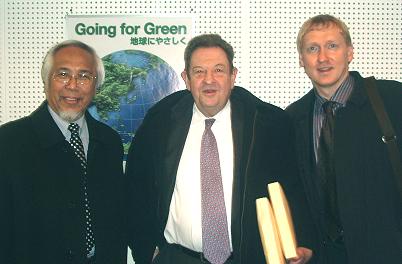ISSUE48: FEBRUARY-APRIL 2007
network of research and training centres/programmes
Think Pieces present fresh ideas on key G8 Summit issues
UN University is mobilising its international community of scholars to offer innovative perspectives and fresh ideas on key agendas issues at the Group of Eight (G8) Japan summit to be held in Hokkaido Toyako in July.
 |
|
Pictured at the
first G8 Dialogue Series event at UNU Centre |
Leading the initiative is UNU Institute of Advanced Studies (UNU-IAS), which has commissioned a series of G8 Dialogues and Think Pieces designed to engage national and international media and the public in the run-up to the G8 summit. Upcoming topics to be covered in the publications and events will touch on G8 issues such as climate change and biodiversity, health, trade and development, Africa, foreign aid, recycling and energy.
In February the first of a series of G8 Dialogues was convened at UNU in Tokyo. On February 15, Prof. Jean Pierre Contzen, an expert on nuclear energy, tackled the question of Nuclear Energy on the Global Scene: a Renaissance?
Professor Contzen concluded that there are reasons for justifying the renaissance of nuclear energy as part of a wider scenario, associating efforts for energy conservation, a greater recourse to renewables and a cleaner utilization of coal and gas. However, this renaissance must be accompanied by unrelenting efforts in maintaining the highest level of safety, guaranteeing non-proliferation, and adequately tackling the issue of the end of the fuel cycle by minimizing the inventory of radioactive waste.
The participants at this event included representatives from over a dozen embassies, as well as other representatives from the IEEE Transactions on Plasma Science, the Institute of Energy Economics, the Peace Boat, Citynet, and the Tokyo Institute of Technology.
On February 25, Dr. Iftekhar Ahmen Chowdhury, a well-known international diplomat and now Foreign Minister of Bangladesh, held a G8 Dialogue on the hopes of least developed countries for the stalled Doha Round of the World Trade Organisation.
Dr. Chowdhury said that the Doha Round should ensure that all exports from all LDC are granted duty-free and quota-free access to developed country markets. He also called for the liberalization of Mode IV services for temporary low-skilled labour migration and pointed out the need for least developed countries to generate resources to adapt to climate change.
Co-hosted with the WTO
Research Center of Aoyama Gakuin University, this event drew over 60
participants including high-level diplomatic representatives,
representatives from the Japanese Ministry of Foreign Affairs, the Japan
Bangladesh Cultural Foundation (JBCF), as well as numerous representatives
from the private sector. Over 15 universities and research institutes
throughout Japan and abroad were represented. ![]() VIDEO
VIDEO
Upcoming contributors to the UNU G8 Dialogues and Think Pieces include:
-
Kiyoshi Kurokawa (Science Advisor to the Cabinet of Japan)
-
Gary Sampson (UNU-IAS Chair of International Economic Governance and former Director at the World Trade Organisation)
-
Calestous Juma (John F Kennedy School of Government, Harvard)
-
Hiroshi Nakada (Mayor of Yokohama)
-
David Runnels (President of International Institute for Sustainable Development)
-
Tatsuro Kunugi (Center of Excellence, International Christian University in Tokyo).
© 2008 United Nations University